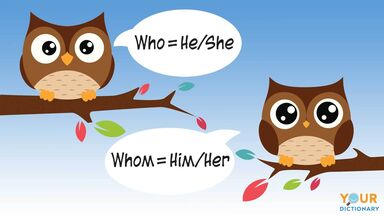He Said Its Suppose to Be Easy
Who or Whom? Easy Ways to Remember
Do you know when to use who or whom in a sentence? Telling the difference between these words is easier than it seems. It's all about knowing how each pronoun functions within a sentence. Learn some easy ways to remember when to use who vs. whom, including tips and tricks to make it all stick.
 who or whom example
who or whom example
The Difference Between Who and Whom
Who and whom are both relative pronouns. They function to connect a noun or another pronoun to a phrase or clause with more information. Both words can also work as interrogative pronouns in questions. However, even though they are both the same kind of pronouns, they are not interchangeable. The difference between these words is:
- Who is a subject pronoun.
- Whom is an object pronoun.
You can only use who as the subject of a sentence; in other words, the person who performs the action. Whom is the object of a sentence. They receive the action performed by the subject.
The Best Way to Remember
If all that seems a tad too technical, here's the best way to remember when to use who and when to use whom. It's all about other subject pronouns (he, she) and object pronouns (him, her).
- Use who when the subject of the sentence would normally require a subject pronoun like he or she. For example, "Who is the best in class?" If you rewrote that question as a statement, "He is the best in class." makes sense.
- Use whom when a sentence needs an object pronoun like him or her. For example, "This is for whom?" Again, if you rewrote that question as a statement, "This is for him." sounds correct.
Replacing the Pronouns in Questions
Another easy way to remember is the "m" in him and whom. If you can answer the question with him, you're using whom correctly. If it doesn't make sense, it's probably supposed to be who instead. For example:
- Who ate the last cookie?
He ate the last cookie. (correct)
Him ate the last cookie. (incorrect)
- For whom did you bake these cookies?
I baked the cookies for he. (incorrect)
I baked the cookies for him. (correct)
The same rule applies in relative clauses. It's a handy trick that helps whenever you're stuck between who and whom when writing a sentence.
Example Sentences With Who and Whom
Knowing who is the subject of a clause while whom is the object of a clause is one thing. Seeing it in action will help this stick in your memory bank. Let's look at a few example sentences with each word.
Sentences With Who
You're likely to see who in questions and sentences that include relative clauses. Who both provides more information about a noun and seeks more information in questions. Sentences in which you would use who instead of whom include:
- Who handed it to her?
- His friend, who lives in Austin, came to visit.
- I wasn't the one who made him feel unwelcome.
- People who take time to be kind are rewarded for their good deeds.
- Couples who hold hands stay together longer.
Remember, who is the person doing the action. As the subject of a clause, who tends to come before the verb of the sentence.
Sentences With Whom
Now that you know how to use who correctly, take a look at sentences with whom. Notice where they're found in a sentence: after the verb (except in a question) and after a preposition.
- He is the one whom I love.
- From whom are we running?
- Those flowers came from whom?
- He is the teacher whom we adore.
- Whom shall I call?
Remember that whom is receiving the action while who is performing the action. For example, "Who will celebrate whom?" In this case, who is performing the action of celebrating, while whom is receiving the action.
Source: https://grammar.yourdictionary.com/grammar-rules-and-tips/grammar-usage-who-versus-whom.html
0 Response to "He Said Its Suppose to Be Easy"
Post a Comment